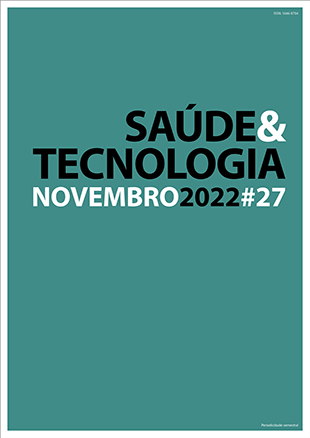Perception of mental health in higher education students: changes due to the COVID-19 pandemic
DOI:
https://doi.org/10.25758/set.595Palavras-chave:
Saúde mental, COVID-19, Confinamento, Estudantes universitários, Exercício físico, AlimentaçãoResumo
The actual pandemic context took several changes in the routine of higher education students, including interruptions of face-to-face classes, implementation of education at a distance, interruption or delayed phases, and others, which could compromise mental health. This study aimed to assess the perception of mental health among higher education students in times of the pandemic COVID-19 and associated factors. The sample was constituted of 1,004 higher education students, aged 18 to 51 years (20.33±3.35), 725 (72.2%) female. The instrument includes a questionnaire, elaborated by the researchers, divided into four parts: characterization social-demographic, physical exercise practice, feeding, and mental health. Before the confinement, 99 (9.9%) students classify their mental health as poor and during the confinement 423 (42.2%) said that their mental health was poor (p≤0.001). Women presented 1.91 (CI=1.42-2.56; p≤0.001) more probabilities of having poor mental health and the students that did not practice physical exercise during the confinement had 1.56 (CI=1.22-2.04; p≤0.001) more chances of having poor mental health. Most students classified their mental health as inferior during confinement due to the COVID-19 pandemic, with women and the lack of physical exercise being the factors that were most related to poor mental health.
Downloads
Referências
Hernández-Torrano D, Ibrayeva L, Sparks J, Lim N, Clementi A, Almukhambetova A, et al. Mental health and well-being of university students: a bibliometric mapping of the literature. Front Psychol. 2020;11:1226.
Hambisa MT, Derese A, Abdeta T. Depressive symptoms among Haramaya university students in Ethiopia: a cross-sectional study. Depress Res Treat. 2020;2020:5027918.
Cleary M, Walter G, Jackson D. Not always smooth sailing: mental health issues associated with the transition from high school to college. Issues Ment Health Nurs. 2011;32(4):250-4.
Conselho de Ministros. Comunicado do Conselho de Ministros de 11 de março de 2021 [homepage]. Governo da República Portuguesa; 2021 Mar 11 [cited 2021 Apr 1]. Available from: https://www.portugal.gov.pt/pt/gc22/governo/comunicado-de-conselho-de-ministros?i=407
Cao W, Fang Z, Hou G, Han M, Xu X, Dong J, et al. The psychological impact of the COVID-19 epidemic on college students in China. Psychiatry Res. 2020;287:112934.
Amatori S, Zeppa SD, Preti A, Gervasi M, Gobbi E, Ferrini F, et al. Dietary habits and psychological states during COVID-19 home isolation in Italian college students: the role of physical exercise. Nutrients. 2020;12(12):3660.
Bloom DA, Reid JR, Cassady CI. Education in the time of COVID-19. Pediatr Radiol. 2020;50(8):1055-8.
Kogan M, Klein SE, Hannon CP, Nolte MT. Orthopaedic education during the COVID-19 pandemic. J Am Acad Orthop Surg. 2020;28(11):e456-64.
Olfert MD, Wattick RA, Saurborn EG, Hagedorn RL. Impact of COVID-19 on college student diet quality and physical activity. Nutr Health. 2022;2601060221086772.
PORDATA. Alunos matriculados no ensino superior: total e por sexo [homepage]. Fundação Francisco Manuel dos Santos; 2021 [updated 2021 Oct 1; cited 2022 Mar 22]. Available from: https://www.pordata.pt/Portugal/Alunos+matriculados+no+ensino+superior+total+e+por+sexo-1048
Ma Z, Zhao J, Li Y, Chen D, Wang T, Zhang Z, et al. Mental health problems and correlates among 746,217 college students during the coronavirus disease 2019 outbreak in China. Epidemiol Psychiatr Sci. 2020;29:e181.
Teixeira LA, Costa RA, Mattos RM, Pimentel D. Brazilian medical students’ mental health during coronavirus disease 2019 pandemic. J Bras Psiquiatr. 2021;70(1):21-9.
DeWitt D. Fighting COVID-19: enabling graduating students to start internship early at their own medical school. Ann Intern Med. 2020;173(2):143-4.
Elmer T, Mepham K, Stadtfeld C. Students under lockdown: comparisons of students’ social networks and mental health before and during the COVID-19 crisis in Switzerland. PLoS One. 2020;15(7):e0236337.
Amaral-Prado HM, Borghi F, Mello TM, Grassi-Kassisse DM. The impact of confinement in the psychosocial behaviour due COVID-19 among members of a Brazilian university. Int J Soc Psychiatry. 2021;67(6):720-7.
Smith L, Hill N, Kokanovic R. Experiences of depression, the role of social support and its impact on health outcomes. J Ment Health. 2015;24(6):342-6.
Geirdal AØ, Ruffolo M, Leung J, Thygesen H, Price D, Bonsaksen T, et al. Mental health, quality of life, wellbeing, loneliness and use of social media in a time of social distancing during the COVID-19 outbreak: a cross-country comparative study. J Ment Health. 2021;30(2):148-55.
Peluso MA, Andrade LH. Physical activity and mental health: the association between exercise and mood. Clinics (Sao Paulo). 2005;60(1):61-70.
Mikkelsen K, Stojanovska L, Polenakovic M, Bosevski M, Apostolopoulos V. Exercise and mental health. Maturitas. 2017;106:48-56.
Zhang Y, Zhang H, Ma X, Di Q. Mental health problems during the COVID-19 pandemics and the mitigation effects of exercise: a longitudinal study of college students in China. Int J Environ Res Public Health. 2020;17(10):3722.
Scarmozzino F, Visioli F. Covid-19 and the subsequent lockdown modified dietary habits of almost half the population in an Italian sample. Foods. 2020;9(5):675.
Sidor A, Rzymski P. Dietary choices and habits during COVID-19 lockdown: experience from Poland. Nutrients. 2020;12(6):1657.
Downloads
Publicado
Edição
Secção
Licença
Direitos de Autor (c) 2023 Saúde & Tecnologia

Este trabalho encontra-se publicado com a Licença Internacional Creative Commons Atribuição-NãoComercial-SemDerivações 4.0.
A revista Saúde & Tecnologia oferece acesso livre imediato ao seu conteúdo, seguindo o princípio de que disponibilizar gratuitamente o conhecimento científico ao público proporciona maior democratização mundial do conhecimento.
A revista Saúde & Tecnologia não cobra, aos autores, taxas referentes à submissão nem ao processamento de artigos (APC).
Todos os conteúdos estão licenciados de acordo com uma licença Creative Commons CC-BY-NC-ND. Os autores têm direito a: reproduzir o seu trabalho em suporte físico ou digital para uso pessoal, profissional ou para ensino, mas não para uso comercial (incluindo venda do direito a aceder ao artigo); depositar no seu sítio da internet, da sua instituição ou num repositório uma cópia exata em formato eletrónico do artigo publicado pela Saúde & Tecnologia, desde que seja feita referência à sua publicação na Saúde & Tecnologia e o seu conteúdo (incluindo símbolos que identifiquem a revista) não seja alterado; publicar em livro de que sejam autores ou editores o conteúdo total ou parcial do manuscrito, desde que seja feita referência à sua publicação na Saúde & Tecnologia.







